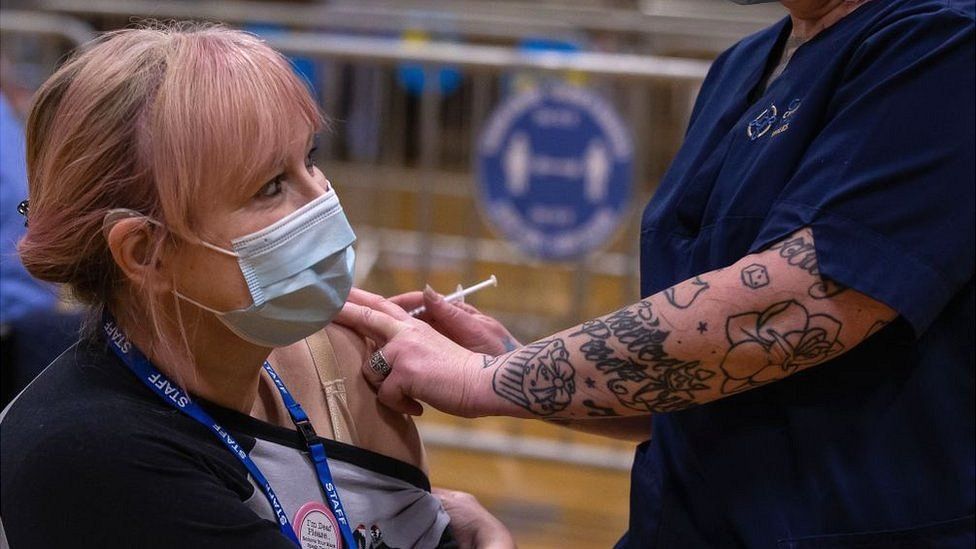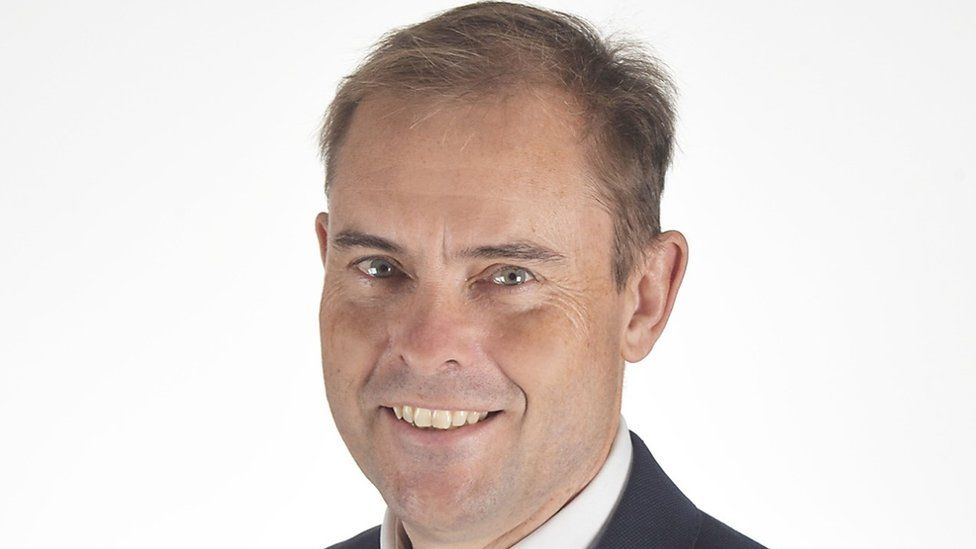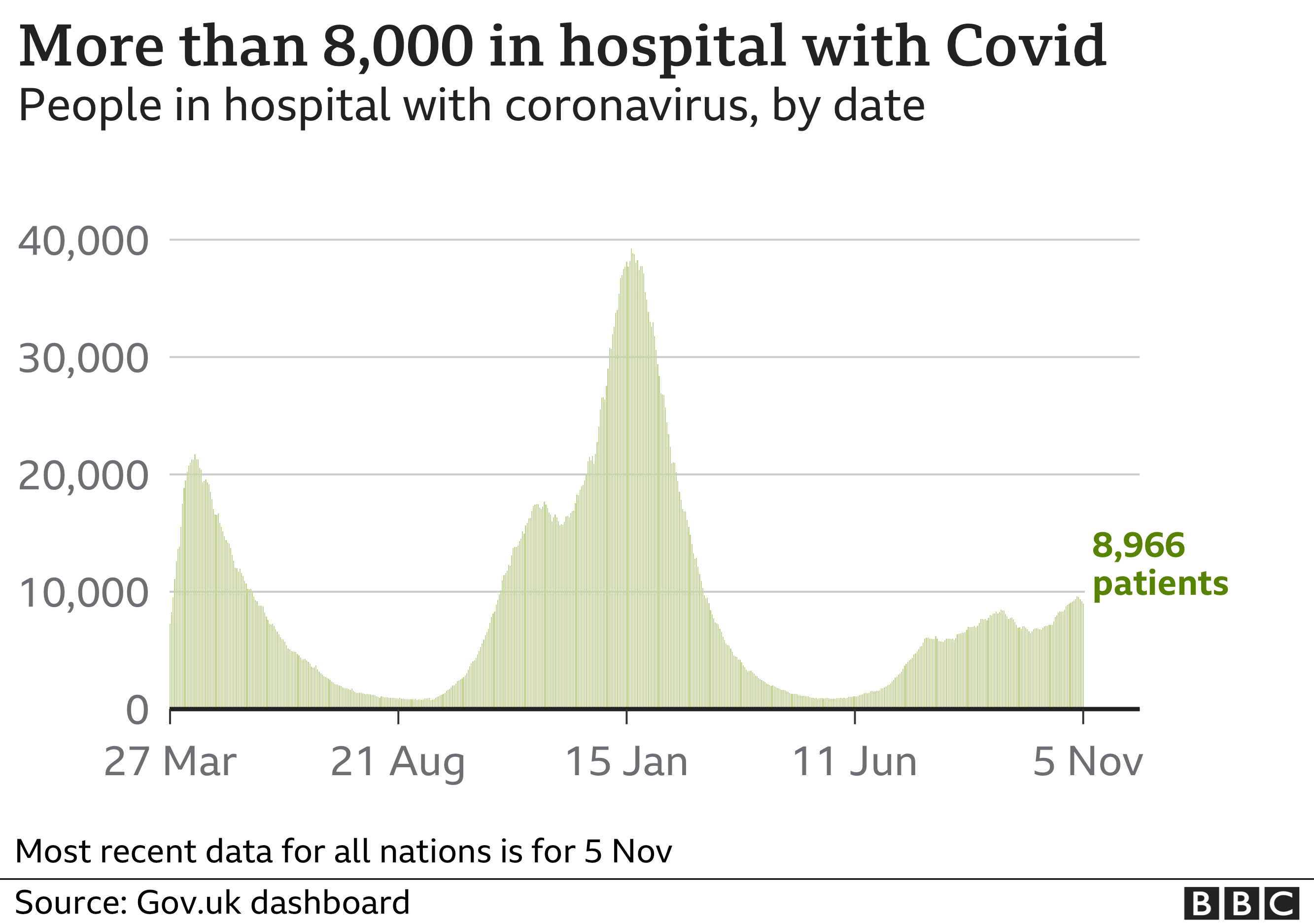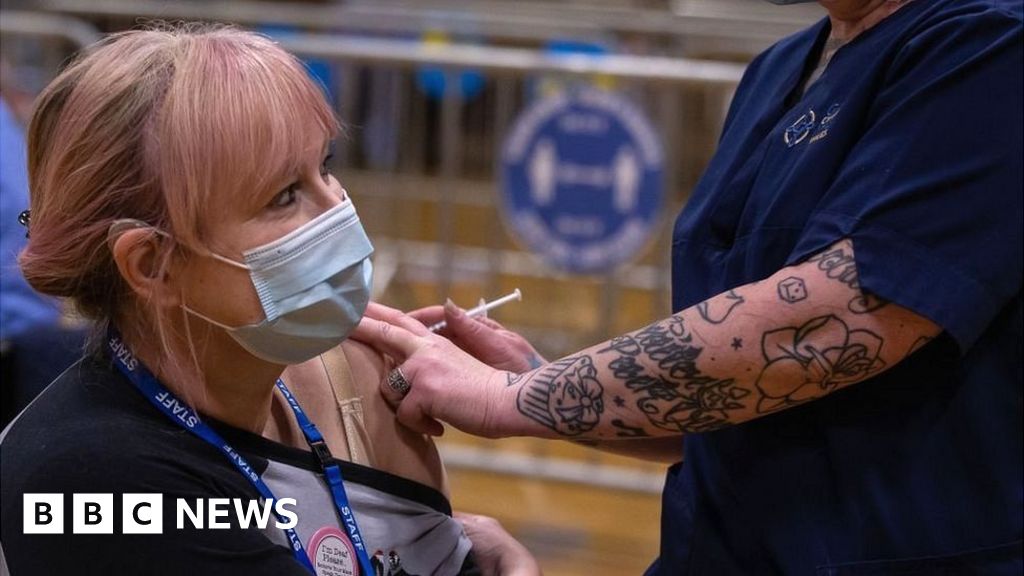
Frontline NHS staff in England will have to be fully vaccinated against Covid to protect patients – and the NHS, the health secretary has announced.
A deadline is expected to be set for 1 April next year to give unvaccinated staff time to get both doses, Sajid Javid told the Commons.
About 103,000 NHS workers in England remain unvaccinated, he said.
Thursday is the deadline for care home workers in England to get vaccinated.
The government’s decision follows a consultation which began in September and considered whether both the Covid and flu jabs should be compulsory for frontline NHS and care workers.
Mr Javid said the flu vaccine would not be made mandatory.
There will be exemptions for the Covid vaccine requirement for medical reasons, and for those who do not have face-to-face contact with patients in their work, he added.
In a statement to MPs, Mr Javid said responses to the consultation showed there was support for compulsory vaccination but also concerns that some people might choose to leave their jobs over the policy.
But, having considered the responses, as well as advice from his officials and NHS leaders, he concluded that all those working in the NHS and social care would have to be vaccinated, he said.
“We must avoid preventable harm and protect patients in the NHS, protect colleagues in the NHS and, of course, protect the NHS itself.”
He said the requirement would be enforced from April, with parliamentary approval.
No unvaccinated worker should be “scapegoated or shamed”, said Mr Javid, and should instead be supported to make “a positive choice”.
Each of the four UK nations makes its own decisions on the issue.
Scotland, Wales and Northern Ireland have not made any proposals to make Covid jabs compulsory for NHS workers or care home staff.
Chris Hopson, chief executive of NHS Providers which represents England’s NHS trusts, said: “We understand why people are vaccine-hesitant. We need to win the argument with them rather than beat them around the head.”
The possibility of losing staff was a “real problem” as the NHS runs on fine margins and already relies on staff to work extra shifts, he added.
Labour’s shadow health secretary Jonathan Ashworth urged Mr Javid to proceed with caution – pointing to waiting lists “close to six million” and more than 90,000 job vacancies across the NHS.
There will be anxiety that chronic understaffing problems could be exacerbated, he said. “We simply cannot afford to lose thousands of NHS staff overnight.”

Will staff vacancies now balloon?

The logic behind this move is obvious – the virus presents a real risk to vulnerable people in hospital and the vaccine reduces the chances of infection and transmission.
So it’s not hard to understand why insisting on jabs for staff who have contact with patients will, in theory, help protect patients.
But if it causes more staffing shortages that simply increases risk in another way.
There are already more than 90,000 vacancies in the NHS in England. It is a number that has actually fallen during the pandemic after staff put off retiring to help out.
If those staff take up their option to retire and mandatory vaccination forces others out, the NHS could find itself severely short of staff come the spring.
Mandatory vaccination comes into force for the care sector on Thursday. Since it was announced only two-thirds of the unvaccinated have come forward.
If a similar trend is seen for the NHS, vacancies would likely balloon to unprecedented levels.

Unison head of health Sara Gorton said she feared the move might knock staff morale further and prompt workers to leave – or lose their job.
The government should consider alternatives like daily testing – not risk making the same mistake made with mandatory jabs in social care which had led to an “unprecedented staffing crisis”, she added.

‘You’ve got to do the right thing’

Douglas Ferguson, a surgeon at Exeter Hospital, said it was the government’s responsibility to protect the population, describing the policy as “quite sensible”.
“I think, to be honest, if people who don’t want to be vaccinated feel that an injection, which is very well scientifically researched, is something that they decide they’re going to change their entire career for, it seems unwise, I would say.”
Overall, Mr Ferguson thought the move was likely to be welcomed by staff.
“If all the staff know everybody else is vaccinated – I mean the majority are already anyway – I think it would give further confidence in you doing your job and potentially from those members of staff also.”
He added that he only knew of one colleague who had chosen not to be vaccinated.

This video can not be played
To play this video you need to enable JavaScript in your browser.
From Thursday, care homes will be required to refuse entry to workers who have not been fully vaccinated, unless they have a medical exemption or there is an emergency.
Mr Javid said that since announcing the requirement for care staff, the number of unvaccinated workers in the sector has fallen from 88,000 to 32,000 in the last month.
In the NHS, more than 92% of frontline staff have had their first dose and 89% are fully vaccinated – higher than the general working-age population, where about 81% have had both doses.
But NHS figures show vaccination rates vary hugely: among hospitals, Dorset County hospital has the highest at 94.6%, while Barts Health NHS Trust has the lowest rate of fully vaccinated staff, at 79.7%.
At Southampton General Hospital, frontline workers were told by letter in September they would face redeployment if they did not get vaccinated.
One worker said she felt bullied and disappointed, saying: “For me, I think it’s freedom of choice.
“I made my mind up that I’m not quite ready yet to have it and it’s my own risk, isn’t it?” she told the BBC in September.
Some countries have already introduced compulsory vaccination – including France, which had to suspend 3,000 unvaccinated healthcare workers in September.
It is unclear exactly which workers will qualify as “frontline”, but BBC health correspondent Nick Triggle said it could include clerical and administrative staff who pass through wards.

More than 45.8 million people in the UK have had two doses of a Covid-19 vaccine, meaning 79.7% of people aged over 12 are fully vaccinated, while 87.4% have had a first dose.
Vaccinated people have a lower risk of catching Covid and are less likely to become seriously ill or need to go to hospital, but there is still a chance they can transmit the virus.
The number of daily confirmed cases of Covid-19 remains high but is falling, with 32,322 reported on Monday. Deaths continue to rise week-on-week, with 1,191 reported in the last seven days.
Correction: This story has been amended to make clear that Barts Health NHS Trust has the lowest vaccine take-up rate among trusts running hospitals in England, and not Bedfordshire Hospitals NHS Foundation Trust as previously stated.

- WE ARE FAMILY, AREN’T WE?: What makes someone part of the family
- PEAKY BLINDERS’ CILLIAN MURPHY: Listen to his perfect after-dark playlist

